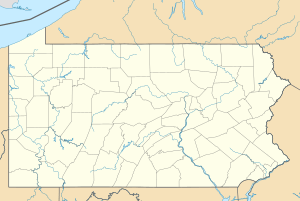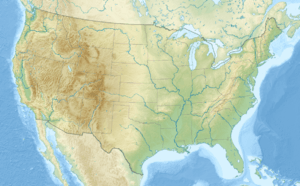Thompson Run (Beaver River tributary) facts for kids
Quick facts for kids Thompson Run |
|
|---|---|
|
Location of Thompson Run mouth
|
|
| Other name(s) | Tributary to Beaver River |
| Country | United States of America |
| State | Pennsylvania |
| County | Beaver |
| Physical characteristics | |
| Main source | divide between Thompson Run and Brush Run about 2 miles east of Homewood, Pennsylvania 1,140 ft (350 m) 40°48′22″N 080°17′20″W / 40.80611°N 80.28889°W |
| River mouth | Beaver River Homewood, Pennsylvania 735 ft (224 m) 40°48′37″N 080°19′04″W / 40.81028°N 80.31778°W |
| Length | 1.32 mi (2.12 km) |
| Basin features | |
| Progression | west |
| River system | Beaver River |
| Basin size | 1.51 square miles (3.9 km2) |
| Tributaries |
|
Thompson Run is a small stream, like a mini-river, located in western Pennsylvania, USA. It's a "tributary," which means it flows into a larger river called the Beaver River. This stream starts in the northern part of Beaver County and travels west until it joins the Beaver River near a town called Homewood, Pennsylvania.
Contents
Thompson Run's Journey
Thompson Run begins high up, about 1,140 feet (347 meters) above sea level. It starts in a place where its water divides from another stream called Brush Run. From there, it flows downhill for about 1.32 miles (2.12 kilometers).
Where Thompson Run Ends
The stream's journey finishes when it reaches the Beaver River. This meeting point is near Homewood, Pennsylvania. At its end, Thompson Run is about 735 feet (224 meters) above sea level.
The Thompson Run Watershed
Even though it's a small stream, Thompson Run helps carry water from an area of about 1.51 square miles (3.91 square kilometers). This whole area, where all the rain and snow eventually drain into Thompson Run, is called its "watershed."
What is a Watershed?
A watershed is like a giant bowl where all the water collects and flows into one main stream or river. For Thompson Run, its watershed covers different types of land. About 12.5% of this area is used for farming. A large part, about 54%, is covered by forests. The rest of the land is used for other things, like homes or roads.
 | John T. Biggers |
 | Thomas Blackshear |
 | Mark Bradford |
 | Beverly Buchanan |



